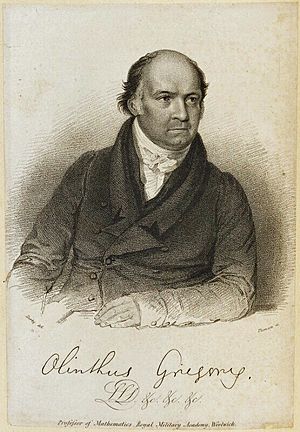Olinthus Gregory facts for kids
Quick facts for kids
Dr Olinthus Gilbert Gregory
LLD, FRAS
|
|
|---|---|

Olinthus Gilbert Gregory
by Thomson, after William Derby © National Portrait Gallery |
|
| Born | 29 January 1774 |
| Died | 2 February 1841 (aged 67) Queen’s Terrace, Woolwich
|
| Nationality | British |
| Occupation | Professor of Mathematics |
| Spouse(s) | (1) Rebecca Marshall (2) Anne Beddome |
Olinthus Gilbert Gregory (born January 29, 1774, died February 2, 1841) was an English mathematician, writer, and editor. He became a professor at the Royal Military Academy in Woolwich. Gregory was also interested in music and helped start a new university in London.
Contents
Life and Education
Olinthus Gregory was born on January 29, 1774, in Yaxley, which was then in Huntingdonshire. His father, Robert, was a shoemaker. Olinthus had three younger sisters.
He was taught by Richard Weston, a botanist from Leicester. In 1793, when Olinthus was just 19, he published his first book. It was called Lessons, Astronomical and Philosophical.
In 1796, Gregory moved to Cambridge. There, he worked as a sub-editor for a newspaper called the Cambridge Intelligencer. After that, he opened his own bookshop.
Becoming a Professor
In 1802, Olinthus Gregory got a job as a mathematics teacher. This was at the Royal Military Academy, Woolwich. He got this job thanks to Charles Hutton, a well-known mathematician. Hutton had seen a paper Gregory wrote about how to use a special ruler called a Sliding Rule.
When Hutton retired in 1807, Gregory took over his position. He became the professor of mathematics at the Academy.
Music and Mathematics
Gregory loved mathematics, but he also had an interesting idea about music. He believed music should follow strict mathematical rules. He wanted to change how musical time was written. Instead of words like Adagio or Allegro, he suggested using exact numbers. These numbers would be based on the swing of a precise pendulum.
This way, every piece of music would be played at the exact same speed, no matter who was conducting. At the Royal Military Academy, they even used a metronome. This device helped keep a steady rhythm in military music.
Starting a New University
Olinthus Gregory strongly supported the idea of a new university in London. This university would not be connected to any church. By the end of 1825, he was part of a special committee. This group of ten people chose the teachers for the new university.
His name was carved onto the foundation stone of the new University. This stone was laid on April 30, 1827, in Gower Street. This university later became University College London.
Later Life and Legacy
Gregory's health began to fail in 1838, and he had to retire. He passed away at his home in Woolwich on February 2, 1841. After his death, his large collection of books was sold.
People thought very highly of Dr. Gregory. A letter written in 1841 showed how much he was respected. It asked for help for his family, who were not well off after his death. The letter was from a former student, who remembered Gregory's hard work and scientific knowledge.
Memberships and Roles
Olinthus Gregory was a member of many important groups and societies. These showed his wide range of interests and his connections with other smart people.
- Corresponding Associate of the Academy of Dijon
- Honorary Member of the Literary and Philosophical Society of New York
- Member of the New-York Historical Society
- Member of the Literary and Philosophical and Antiquarian Societies of Newcastle upon Tyne
- Member of the Cambridge Philosophical Society
- Member of the Institution of Civil Engineers
- Founder member, and later Secretary, of the Astronomical Society
- Professor of Mathematics in the Royal Military Academy, Woolwich
- Co-founder and first president of the Woolwich Institution for the Advancement of Literary, Scientific and Technical Knowledge
Besides his academic work, Gregory was also an editor for several publications. In 1802, he became the editor of the Gentlemen's Diary. From 1819 to 1840, he edited the Lady's Diary. He also managed all the almanacs published by the Stationers’ Company starting in 1817.
Family Life
Olinthus Gregory married Rebecca Marshall on March 4, 1798. They had a son named James and a daughter named Eliza. Sadly, Rebecca passed away in June 1807.
He married again on December 20, 1809, to Anne Beddome. They had two sons and a daughter. Their older son, Boswell Robert, tragically drowned in the River Thames in Woolwich in 1834. He was only 21 years old.
Their second son was named Charles Hutton Gregory. He was named after Charles Hutton, the mathematician who helped Olinthus get his first teaching job. Charles Hutton Gregory later became the president of the Institution of Civil Engineers, just like his father.
Anne, Olinthus's second wife, died in 1855. She was buried in Plumstead.
Works
Olinthus Gilbert Gregory wrote several important books and articles during his lifetime. These works covered topics like mathematics, astronomy, and philosophy. He also edited many popular publications, sharing knowledge with a wider audience.
 | Georgia Louise Harris Brown |
 | Julian Abele |
 | Norma Merrick Sklarek |
 | William Sidney Pittman |

